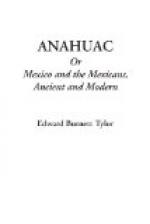When the Spaniards came to these countries, as soon as they had leisure to ask themselves what could be the origin of the people they found there, the answer came at once, “the lost tribes of Israel,” of course. And as we looked at these grave taciturn men, with their brown complexions, bright eyes, and strikingly aquiline noses, it did not seem strange that this belief should have been generally held, considering the state of knowledge on such matters in those days. We English found the ten tribes in the Red men of the north; Jews have written books in Hebrew for their own people, to make known to them that the rest of their race had been found in the mountains of Chili, retaining unmistakable traces of their origin and conversing fluently in Hebrew; and but lately they turned up, collected together and converted to Christianity, on the shores of the Caspian. The last two theories have their supporters at the present day. Crude as most of these ideas are, one feels a good deal of interest in the first inquiry that set men thinking seriously about the origin of races, and laid the foundation of the science of ethnology.
Our return on board was a long affair, for there was a stiff breeze, almost in our teeth; and our unwieldy craft was obliged to make tack after tack before we could reach the steamer. Great Portuguese men-of-war were floating about, waiting for prey; and we passed through patches of stringy gulf-weed, trailing out into long ropes. The water was hot, the thermometer standing at 84 deg. when we dipped it over the side.
On the morning of the 12th, when we went on deck, there was a grand sight displayed before us. No shore visible, but a heavy bank of clouds on the horizon; and, high above them, towering up into the sky, the snowy summit of Orizaba, a hundred and fifty miles off.
Before noon, we are entering the harbour of Vera Cruz. The little island and fort of San Juan de Ulua just opposite the wharfs, the island of Sacrificios a little farther to the left. A level line of city-wall along the water’s edge; and, visible above it, the flat roofs of the houses, and the towers and cupolas of many churches. All grey stone, only relieved by the colored Spanish tiles on the church-roofs, and a flag or two in the harbour. Not a scrap of vegetation to be seen, and the rays of a tropical sun pouring down upon us.
Established in the Casa de Diligencias, we deliberated as to our journey to Mexico. The diligences to the capital, having been stopped for some months on account of the disturbed state of the country, had just begun to run again, avoiding Puebla, which was being besieged. We were anxious to be off at once; but Mr. Christy sagaciously remarking that the robbers would know of the arrival of the steamer, and would probably take the first diligence that came afterwards, we booked our places for the day after.
We were very kindly received by the English merchants to whom my companion had letters, and we set ourselves to learn what was the real state of things in Mexico.




